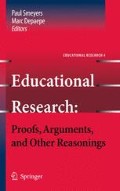Abstract
This chapter1 is written in a context in which there has been publicly expressed discontent among the educational policy community about the failure of educational research to engage effectively with and to inform policy (Hargreaves, 1996; Hillage, Pearson, Anderson, & Tamkin, 1998; Tooley & Darby, 1998; Blunkett, 2000), echoed slightly less volubly by discontent among the educational research community with the failure of policy makers to take any notice of their research.
Access this chapter
Tax calculation will be finalised at checkout
Purchases are for personal use only
References
Arendt, H. (1961). ‘The crisis in culture’: Between past and future: Six exercises in political thought. New York: Meridien.
Ball, S. (1990). Politics and policy making in education. London: Routledge.
Blunkett, D. (2000). Influence or irrelevance? Can social science improve government? Presentation at ESRC seminar, february. London: DfES.
Bridges, D. (2008). Evidence-based reform in education: A response to Robert Slavin. European Educational Research Journal, 7(1), 129–133.
Bridges, D., Smeyers, P., & Smith, R. D. (2008). Evidence based educational policy: What evidence? What basis? Whose policy. Journal of Philosophy of Education, 42(1), 179–194. (This has also been issued 2009 in book form published by Blackwell)
Bridges, D., & Watts, M. (2008). Educational research and policy: Epistemological considerations. Journal of Philosophy of Education, 42, 41–62.
Clifford, W. (1879). The ethics of belief’ in lectures and essays (Vol. 2). London: Macmillan.
Conroy, J., Davis, R., & Enslin, P. (2008). Philosophy as a basis for policy and practice: What confidence can we have in philosophical analysis and argument? Journal of Philosophy of Education, 42, 165–182.
Elliott, J., & Lukeš, D. (2008). Epistemology as ethics in research and policy: Under what terms might case studies yield useful knowledge to policy makers. Journal of Philosophy of Education, 42, 87–120.
Griffiths, M., & Mcleod, G. (2008). Personal narratives and policy: Never the twain? Journal of Philosophy of Education, 42, 121–143.
Hammersley, M. (2002). Educational research, policy making and practice. London: Paul Chapman.
Hargreaves, D. (1996). Teaching as a research based profession: Possibilities and prospects. London: Teacher Training Agency.
Hargreaves, D. (1997). In defence of evidence based teaching. British Educational Research Journal, 23(4), 405–419.
Hayek, F. A. (1960). The constitution of liberty. London: Routledge and Kegan Paul.
Hillage, J., Pearson, R., Anderson, A., & Tamkin, P. (1998). Excellence in research on schools. London: DfEE.
Iser, W. (1971). Indeterminacy and the reader’s response in prose fiction. In J. Hillis Miller (Ed.), Aspects of narrative: Selected papers from the english institute (pp. 1–45). New York: University of Columbia Press.
James, W. (1890). The principles of psychology. New York: Henry Holt.
James, W. (1937). The will to believe and other essays. London: Longman Green.
Jauss, H. R. (1982). Toward an aesthetic of reception (T. Bahti, Trans.). Minneapolis, MN: University of Minnesota Press.
Levin, B. (2004). Making research matter more. Education Policy Analysis Archives, 12(56), 1–20.
Matthews, S. (2004). The responsibilities of dissent: F.R. Leavis after scrutiny. Literature and History, 13(2), 49–66.
McCarthy, G. D. (1986). The ethics of belief debate. Atlanta, Georgia: Scholar Press.
Mill, J. S. (1859/1865 edition). On liberty. London: Longman Green.
Munn, P. (2005). Researching policy and policy research. Scottish Educational Review, 37(1), 17–28.
National Audit Office. (2001). Modern policy making: Ensuring policies deliver value for money. London: National Audit Office.
No Child Left Behind Act (Elementary and Secondary Education Act), US. (2001/2002). At http://www.ed.gov/policy/elsec/leg/esea02/index.html [downloaded March 2008].
Nussbaum, M. (1990). The discernment of perception: An aristotelian conception of private and public morality. In love’s knowledge: Essays on philosophy and literature. Oxford: Oxford University Press.
Oancea, A., & Pring, R. (2008). The importance of being thorough: On systematic accumulations of ‘what works’ in educational research. Journal of Philosophy of Education, 42, 15–40.
Ozga, J. (2000). Policy research in educational settings: Contested terrain. Buckingham: Open University Press.
Pike, M. (2002). The canon in the classroom: Students’ experiences of texts from other times. Journal of Curriculum Studies, 35(3), 355–370.
Polanyi, M. (1951). The logic of liberty. London: Routledge and Kegan Paul.
Popper, K. (1963). Conjectures and refutations. London: Routledge and Kegan Paul.
Slavin, R. E. (2002). Evidence-based education policies: Transforming educational practice and research. Educational Researcher, 31(7), 15–21.
Slavin, R. E. (2004). Education research can and must address ‘what works’ questions. Educational Researcher, 33(1), 27–28.
Slavin, R. (2008). Evidence based reform: What will it take? European Educational Research Journal, 7(1), 120–128.
Smeyers, P., & Depaepe, M. (2006). Educational research: Why ‘what works’ doesn’t work. Dordrecht: Springer.
Smith, R. D. (2007). As if by machinery: The levelling of educational research. In D. Bridges & R. D. Smith (Eds.), Philosophy, methodology and educational research. Oxford: Blackwell.
Smith, R. D. (2008). Proteus rising: Re-imagining educational research. Journal of Philosophy of Education, 42, 183–198.
Stenhouse, L. (1980). What counts as research? (Unpublished mimeo). University of East Anglia, Norwich: CARE archive.
Tooley, J., & Darby, D. (1998). Education research: A critique – a survey of published educational research. London: OFSTED.
Whitty, G. (2002). Making sense of educational policy. London: Paul Chapman.
Whitty, G. (2006). Education(al) research and education policy making: Is conflict inevitable? British Educational Research Journal, 32(2), 159–176.
Author information
Authors and Affiliations
Corresponding author
Editor information
Editors and Affiliations
Rights and permissions
Copyright information
© 2009 Springer Science+Business Media B.V.
About this chapter
Cite this chapter
Bridges, D. (2009). Reasoning from Educational Research to Policy. In: Smeyers, P., Depaepe, M. (eds) Educational Research: Proofs, Arguments, and Other Reasonings. Educational Research, vol 4. Springer, Dordrecht. https://doi.org/10.1007/978-90-481-3249-2_13
Download citation
DOI: https://doi.org/10.1007/978-90-481-3249-2_13
Published:
Publisher Name: Springer, Dordrecht
Print ISBN: 978-90-481-3248-5
Online ISBN: 978-90-481-3249-2
eBook Packages: Humanities, Social Sciences and LawEducation (R0)

